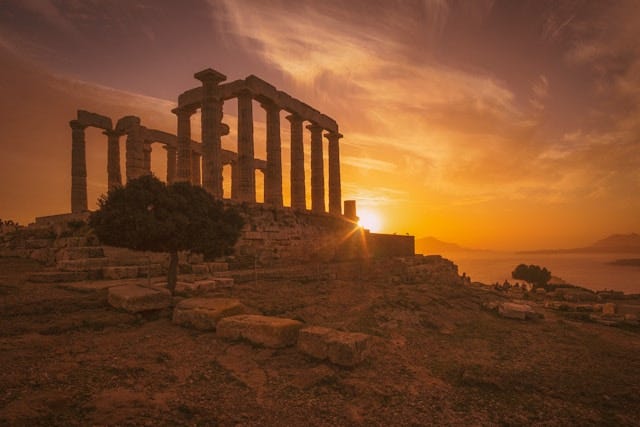In But Not Of the World
7/16/25 Bible Thought (1 Corinthians 10)

The Christian race is to be run or lived out with diligence.
In 1 Corinthians 10, the apostle Paul continues this line of thinking, primarily focused on the topic of idolatry.
There was a sanctuary in Isthmia only a few miles down the road from Corinth, that was dedicated to the worship of the Greek god Poseidon. This sanctuary was accompanied by all manner of sexual immorality and idol worship.[1]
So, Paul warned the church about being united with idols. For although there might not be a “god” on the other side of the idol, there are actually demons (1 Cor. 10:21).
This type of worship would’ve been commonly encountered by the Corinthians. It was all around them in their culture and at times was probably almost inescapable. Even meat sold at the market could’ve been presumably sacrificed to idols!
Aside from avoiding the temple and its worship, in such an environment the Christian couldn’t be entirely separate. You could refrain from going there, but how about when the temple effectively came to you?
The Christian was given a little leeway in this instance.
For example, they needn’t ask about everything they eat in their day to day lives (1 Cor. 10:25) for ultimately it all belongs to God anyways and is His rightful possession (1 Cor. 10:26). They could eat those things without even asking about it and continue in a God-permitted ignorance of where the meat came from.
That is, so long as it didn’t cause others to stumble because of matters of conscience or hurt their Christian witness. Paul concluded in this matter,
“Let no one seek his own good, but the good of his neighbor” (1 Cor. 10:24).
So, if one of them happened to be at a dinner where they found out that the meat was sacrificed to an idol they would then abstain from it for the sake of the person who told them (1 Cor. 10:27-30).
So, how does this apply to us today? We aren’t introduced to the same idol-worship at the sanctuary of a Greek god. Yet, our culture certainly has its own sins that take center stage.
With this, the Christian is to avoid explicitly sinful things.
We should be distinct as those who are in the world but not of the world. There will be times we have to refrain from participating in certain things because of personal convictions. The Christ-follower ought to be separate.
Yet, there are times when sin isn’t written in lights.
Perhaps it’s not the equivalent of idol-worship in the temple but the stuff at the meat market that may or may not have been involved in idol-worship. It appears that based off this passage some ignorance is permitted on the part of the Christian. If it’s not known to be explicitly sinful, we can enjoy things with thanksgiving knowing that ultimately everything belongs to God anyways.
I know some Christians will research every company and every product and every detail of different things because they don’t want to support people who promote different values than ours.
That can be commendable, but it can be suffocating in a world that has rejected God.
At some point, we have to be able to do business where God has placed us without feeling guilty or wondering about the beliefs of the one who grows our vegetables or manufactures our t-shirts.
We separate from worldliness where things are explicit, but we also acknowledge that we can’t separate from the world fully. It is our temporary home that can’t be escaped. It’s our mission field. So, we’re to live here, to do business, to eat and drink, and all of this—but we’re to do it for the glory of God (1 Cor. 10:31).
[1] Clinton E. Arnold, Zondervan Illustrated Bible Backgrounds Commentary: Romans to Philemon. (Grand Rapids, MI: Zondervan, 2002), 151–152.


Such a good and important teaching today. We are in the world but not of it. That seems to mean we can't escape dealing with the things and people who belong to this world, but we're not of them, not with them, and don't belong to their temporary system. The world with its desires and pleasures pass away.
A good word and reminder for us all.